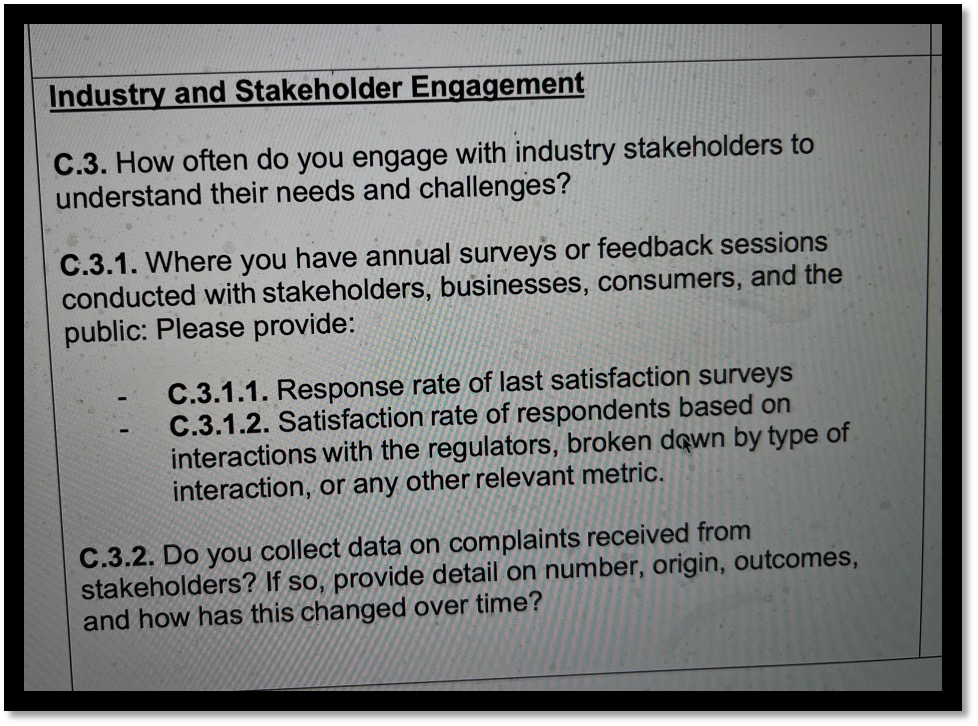This is Blog no 95
One look at the Spring Statement arithmetic, and it’s clear why the Government is having to double-down on its ‘growth’ strategy. It would have been hard enough anyway, but Trump means trouble and economies throughout Western Europe and beyond will struggle to avoid recession if his trade war materialises.

This is why I’ve been paying particular attention to the changes likely to affect Regulators. There are well over 100 such bodies in the UK, and far more if we include those that govern the professions and other Quangos that perform semi-regulatory functions. Consultation GuRU has a particular interest because many of them rely heavily on consultation – both technical exercises aimed at stakeholders, and also public consultations on the likely impact of their actions on the wider community.
Regulators are responsible for some of the best consultations I know … and the worst!
At their best, they are well researched, accurately scoped, properly conducted, and influential in shaping the decisions taken by these independent bodies. Let’s stress their independence. Although every one of the long list of Regulators has a sponsoring department, they have been established as arms-length bodies precisely because it’s often desirable to take market-sensitive decisions away from the hands of politicians!
Their task is often a difficult balancing act – reconciling the conflicting interests of various stakeholders. This is why they rely on building and sustaining good long-term relationships both with those they regulate, and those who most need regulation to succeed. It also explains why they need to engage transparently and systematically, so hence tend to use formal consultations extensively.
It always struck me that Regulators would come under pressure from a new Government. Its ambitions for ‘change’ would clearly be frustrated by a lack of money, but tighter regulation could make a difference to people’s lives in so many ways. It was therefore no surprise when, on 17th March, the Chancellor ‘invited’ the bosses of the biggest Regulators for a meeting in Downing Street. It didn’t sound the kind of invitation one could turn down. And in any case, who could resist Ms Reeves’ unveiling of an Action Plan “… to deliver on the pledge to cut the administrative cost of regulation on business by a quarter, make Britain the best place to do business and drive economic growth.”
It’s not a very inspiring document but is obviously a major policy initiative by the Government and we should take it seriously. Paraphrasing, its analysis is that there are too many Regulators. UK Regulation is often too complex and ‘duplicative’ (new word for me !!), underpinning legislation is poorly drafted, there is mission-creep, it is risk-averse, and it all costs business far too much. Instead, Ministers want Regulators to support growth, be targeted, proportionate, transparent and predictable. And it must keep pace with innovation. There are three headline actions:
- Tackle complexity and reduce the burden. Some will be abolished, some will merge, but the central proposition is that the ‘cost to business’ will be reduced by 25%. This is fascinating as it is then admitted that they actually don’t know how to count it ( “…government does not have a robust understanding of the cumulative cost...!”). If you don’t know what it is, it’s a little tricky to be sure that it’s precisely a 25% reduction you need! It then illustrates how it will streamline and simplify in the fields of health/safety regulation and also from planning/environment – taking great care to have a well-publicised swipe at the Bat Conservation Trust!
- Reduce uncertainty. This is mostly about re-defining roles, shaking up the Competition & Markets Authority and easing environmental bodies like Natural England out of the way of builders and developers. It also requires Regulators to ‘publish clear, time-bound targets for processing authorisations.’ Gosh; I must be naïve because I’d have expected every properly-managed Regulator to be doing that already.
- Challenge and shift excessive risk aversion. They must think this is very important because it says that it requires a ‘whole-of-government approach.’ Wow! As it covers AI and innovation, this presumably is a given; examples are taken from the UK space industry, engineering biology, quantum technology and drones transferring blood between two London hospitals.
Finally, there is a long list of 60 ‘key regulator pledges’ – actions and initiatives from 13 Regulators that will have a tangible effect on driving growth and investment … within the next 12 months. All good stuff, except that any experienced observer would immediately identify most of these as existing work-in-progress, and fortuitously available when the ‘call for evidence’ email came – asking for items with which to illustrate the Action Plan!
In fairness, it is easy to be a little cynical or even whimsical about some of this – but in fact it is very serious. The way in which Regulators operate has an immediate and real-world impact on our lives. Ask those in high-rise flats with suspect cladding. Or patients unhappy about their GP surgery … or their local schools. Think about the safety of drivers on our roads or planes in the skies. To what extent do people want any erosion of the high regulatory standards to which we have become accustomed? Without consultation …?
Few will object to rationalising and modernising some Regulators. Indeed, abolishing NHS England will, overall, be an effective and overdue step. As for keeping up with new ideas and new technology, let’s note that a Regulatory Innovation Office, under the helm of the respected Lord Willetts was set up last October, and in January the Regulatory Horizons Council was launched – both before the PM realised that Quangos were undesirable.
Neither is asking Regulators to have regard to economic growth new. As far back as 2015, the then Government inserted into the Deregulation Act (S.108) a duty to promote economic growth. The 2017 Statutory Guidance reads as if written last week by Rachel Reeves. Then, in the dying days of Rishi Sunak’s administration, it published a Growth Duty Performance Framework – again fully compatible with last week’s Downing Street event. Is it possible that the same officials are just continuing where they left off?

The Chancellor made no mention of the Framework. But had she looked at it, she might have noticed a set of (admittedly self-assessed) questions, including those in the photo. The key question is this: “How often do you engage with industry stakeholders to understand their needs and challenges?”
Spot-on! It strikes me that asking Regulators to subsume their core function of balancing the interests of multiple and conflicting stakeholders into a wider Government agenda may be precisely the mission creep that other critics have complained about.
There is nothing inherently wrong with Ms Reeves initiative – and it might well do some good. But if we consulted the public about what it fundamentally needs from Regulation, I’d be surprised if ‘taking account’ of economic growth was top of the list.
But then, we live in an age of performative politics … and better get used to it.
Rhion H Jones LL.B
For more like this, and to receive the monthly Consultation Catch-up, click here
Leave a Comment
I hope you enjoyed this post. If you would like to, please leave a comment below.